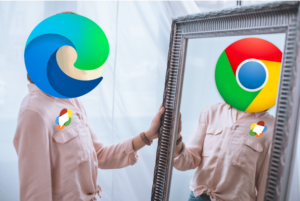SDP has been a frequent topic, both here on webrtcHacks as well as in the discussion about the standard itself. Modifying the SDP in arcane ways is referred to as SDP munging. This post gives an introduction into what SDP munging is, why its done and why it should not be done. This is not […]
Perfect Negotiation
Series preface: We generally lean toward long posts here at webrtcHacks, but not all interesting topics warrant a lot of new text. Sometimes briefer is better. So to better address the many topics that fit into this category, we are starting a new Minimum Duration series. Here is our first post under this set covering […]
Does Chromium-based Edge’s WebRTC Look Like Chrome?
WebRTC has a new browser – kind of. Yesterday Microsoft’s “new” Edge browser based on Chromium – commonly referred to Edgium – went GA. This certainly will make life easier for WebRTC developers since the previous Edge had many differences from other implementations. The big question is how different is Edgium from Chrome for WebRTC […]
Is everyone switching to Unified Plan?
Review of Chrome’s migration to WebRTC’s Unified Plan, how false metrics may have misguided this effort, and what that means moving forward.
and the WebRTC Open Source Popularity Contest Winner is…
An analysis of the most popular open-source WebRTC repos on GitHub with a review of how WebRTC itself is doing there.





